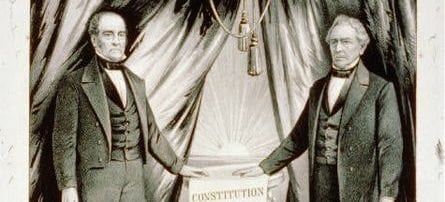Private & confidential.
Hon. O. H. Browning
My dear Sir
Yours of the 17th is just received; and coming from you, I confess it astonishes me. That you should object to my adhering to a law, which you had assisted in making, and presenting to me, less than a month before, is odd enough. But this is a very small part. Genl. Fremont’s proclamation, as to confiscation of property, and the liberation of slaves, is purely political, and not within the range of military law, or necessity. If a commanding General finds a necessity to seize the farm of a private owner, for a pasture, an encampment, or a fortification, he has the right to do so, and to so hold it, as long as the necessity lasts; and this is within military law, because within military necessity. But to say the farm shall no longer belong to the owner, or his heirs forever; and this as well when the farm is not needed for military purposes as when it is, is purely political, without the savor of military law about it. And the same is true of slaves. If the General needs them, he can seize them, and use them; but when the need is past, it is not for him to fix their permanent future condition. That must be settled according to laws made by law-makers, and not by military proclamations. The proclamation in the point in question, is simply “dictatorship.” It assumes that the general may do anything he pleases—confiscate the lands and free the slaves of loyal people, as well as of disloyal ones. And going the whole figure I have no doubt would be more popular with some thoughtless people, than that which has been done! But I cannot assume this reckless position; nor allow others to assume it on my responsibility. You speak of it as being the only means of saving the government. On the contrary it is itself the surrender of the government. Can it be pretended that it is any longer the government of the U.S.—any government of Constitution and laws,—wherein a General, or a President, may make permanent rules of property by proclamation?
I do not say Congress might not with propriety pass a law, on the point, just such as General Fremont proclaimed. I do not say I might not, as a member of Congress, vote for it. What I object to, is, that I as President, shall expressly or impliedly seize and exercise the permanent legislative functions of the government.
So much as to principle. Now as to policy. No doubt the thing was popular in some quarters, and would have been more so if it had been a general declaration of emancipation. The Kentucky Legislature would not budge till that proclamation was modified; and Gen. Anderson telegraphed me that on the news of Gen. Fremont having actually issued deeds of manumission, a whole company of our Volunteers threw down their arms and disbanded. I was so assured, as to think it probable, that the very arms we had furnished Kentucky would be turned against us. I think to lose Kentucky is nearly the same as to lose the whole game. Kentucky gone, we can not hold Missouri, nor, as I think, Maryland. These all against us, and the job on our hands is too large for us. We would as well consent to separation at once, including the surrender of this capitol. On the contrary, if you will give up your restlessness for new positions, and back me manfully on the grounds upon which you and other kind friends gave me the election, and Mr. Chairman: At the beginning of our civil conflict this House passed almost unanimously a resolution offered by the gentleman from Kentucky
Mr. have approved in my public documents, we shall go through triumphantly.
You must not understand I took my course on the proclamation because of Kentucky. I took the same ground in a private letter to General Fremont before I heard from Kentucky… .
There has been no thought of removing Gen. Fremont on any ground connected with his proclamation. . . . I hope no real necessity for it exists on any ground… .
A. Lincoln








































































































































































































